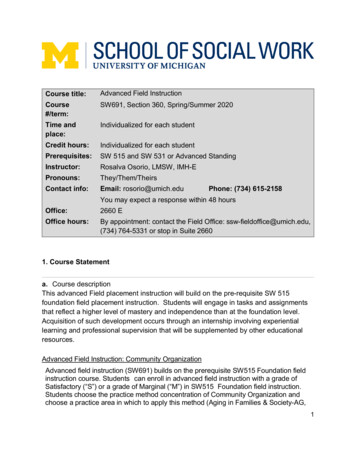
Transcription
Course title:Advanced Field InstructionCourse#/term:SW691, Section 360, Spring/Summer 2020Time andplace:Individualized for each studentCredit hours:Individualized for each studentPrerequisites:SW 515 and SW 531 or Advanced StandingInstructor:Rosalva Osorio, LMSW, IMH-EPronouns:They/Them/TheirsContact info:Email: rosorio@umich.eduPhone: (734) 615-2158You may expect a response within 48 hoursOffice:2660 EOffice hours:By appointment: contact the Field Office: ssw-fieldoffice@umich.edu,(734) 764-5331 or stop in Suite 26601. Course Statementa. Course descriptionThis advanced Field placement instruction will build on the pre-requisite SW 515foundation field placement instruction. Students will engage in tasks and assignmentsthat reflect a higher level of mastery and independence than at the foundation level.Acquisition of such development occurs through an internship involving experientiallearning and professional supervision that will be supplemented by other educationalresources.Advanced Field Instruction: Community OrganizationAdvanced field instruction (SW691) builds on the prerequisite SW515 Foundation fieldinstruction course. Students can enroll in advanced field instruction with a grade ofSatisfactory (“S”) or a grade of Marginal (“M”) in SW515 Foundation field instruction.Students choose the practice method concentration of Community Organization andchoose a practice area in which to apply this method (Aging in Families & Society-AG,1
Children & Youth and Families in Society-C & Y, Communities & Social Systems-CSS,Health-H, and Mental Health-MH). In advanced field instruction, students will engage intasks and assignments that reflect a higher-level mastery of knowledge and increasedindependence in functioning that is designed to facilitate growth as a social workpractitioner while strengthening professional identity. Students in this course will focuson learning Community Organization skills through experiential learning opportunities,professional, credentialed supervision, supplemental readings, case-baseddiscussions/conferences, meetings, and other learning opportunities available in theassigned fieldwork setting. These field-based assignments are designed to helpstudents become proficient in the established social work competencies by developingprofessional practice behaviors (a blend of activities, knowledge and skills), focusingon the Community Organization method. Students will acquire and develop skills andpractice behaviors that exhibit the attainment/proficiency of each social workcompetency in the Community Organization method through direct serviceresponsibilities with individuals, families, groups and the service environment. Thesewill be evaluated through the development of specific field-based assignments focusingon the Community Organization method and practice behaviors related to each socialwork competency found on the Community Organization Education Agreement. Theseassignments will be rated at the end of each term using the established scale. Studentsin advanced field instruction have opportunities to apply their skills in a greater varietyof circumstances, with greater depth and breadth over a sustained period of time withthe goal of increasing the rigor and complexity in the assignments as well asindependence. The social work competencies for advanced field instruction areindicated below and are found on the Community Organization EducationalAgreement. The goal is for students to achieve proficiency in each competencyindicated below and to find ways to integrate classroom knowledge with practiceexperiences. The goal is for students to achieve proficiency in each competencyindicated below and to find ways to integrate classroom knowledge with practiceexperiences.Advanced Field Instruction: Interpersonal PracticeAdvanced field instruction (SW691) builds on the prerequisite SW515 Foundation fieldinstruction course. Students can enroll in advanced field instruction with a grade ofSatisfactory (“S”) or a grade of Marginal (“M”) in SW515 Foundation field instruction.Students choose the practice method concentration of Interpersonal Practice andchoose a practice area in which to apply this method (Aging in Families & Society-AG,Children & Youth and Families in Society-C & Y, Communities & Social SystemsCSS, Health-H, and Mental Health-MH). In advanced field instruction, students willengage in tasks and assignments that reflect a higher level mastery of knowledge andincreased independence in functioning which is designed to facilitate growth as asocial work practitioner while strengthening professional identity. Students in thiscourse will focus on learning Interpersonal Practice skills through experiential learningopportunities, professional, credentialed supervision, supplemental readings, casebased discussions/conferences, meetings, and other learning opportunities availablein the assigned fieldwork setting. These field-based assignments are designed to help2
students become proficient in the established social work competencies bydeveloping professional practice behaviors (a blend of activities, knowledge andskills), focusing on the Interpersonal Practice method. Students will acquire anddevelop skills and practice behaviors that exhibit the attainment/proficiency of eachsocial work competency in the Interpersonal Practice method through direct serviceresponsibilities with individuals, families, groups and the service environment. Thesewill be evaluated through the development of specific field-based assignmentsfocusing on the Interpersonal Practice method and practice behaviors related to eachsocial work competency found on the Interpersonal Practice Education Agreement.These assignments will be rated at the end of each term using the established scale.Students in advanced field instruction have opportunities to apply their skills in agreater variety of circumstances, with greater depth and breadth over a sustainedperiod of time with the goal of increasing the rigor and complexity in the assignmentsas well as independence. The social work competencies for advanced field instructionare indicated below and are found on the Interpersonal Practice EducationalAgreement. The goal is for students to achieve proficiency in each competencyindicated below and to find ways to integrate classroom knowledge with practiceexperiences.Advanced Field Instruction: Social Policy and EvaluationAdvanced field instruction (SW691) builds on the prerequisite SW515 Foundation fieldinstruction course. Students can enroll in advanced field instruction with a grade ofSatisfactory (“S”) or a grade of Marginal (“M”) in SW515 Foundation field instruction.Students choose the practice method concentration of Social Policy and Evaluationand choose a practice area in which to apply this method (Aging in Families & SocietyAG, Children & Youth and Families in Society-C & Y, Communities & Social SystemsCSS, Health-H, and Mental Health-MH). In advanced field instruction, students willengage in tasks and assignments that reflect a higher-level mastery of knowledge andincreased independence in functioning that is designed to facilitate growth as a socialpolicy and evaluation specialist social work practitioner while strengthening socialwork professional identity. Students in this course will focus on learning Social Policyand Evaluation skills through experiential learning opportunities, professional,credentialed supervision, supplemental readings, case-baseddiscussions/conferences, meetings, and other learning opportunities available in theassigned fieldwork setting. These field-based assignments are designed to helpstudents become proficient in the established social work competencies by developingprofessional practice behaviors (a blend of activities, knowledge and skills), focusingon the Social Policy and Evaluation method. Students will acquire and develop skillsand practice behaviors that exhibit the attainment/proficiency of each social workcompetency in the Social Policy and Evaluation method through direct serviceresponsibilities with individuals, families, groups, communities, organizations and thewider service environment. These will be evaluated through the development ofspecific field-based assignments focusing on the Social Policy and Evaluation methodand practice behaviors related to each social work competency found on the SocialPolicy and Evaluation Education Agreement form. These assignments will be rated at3
the end of each term using the established scale. Students in advanced fieldinstruction have opportunities to apply their skills in a greater variety of circumstances,with greater depth and breadth over a sustained period of time with the goal ofincreasing the rigor and complexity in the assignments as well as independence. Thesocial work competencies for advanced field instruction are indicated below and arefound on the Social Policy and Evaluation Educational Agreement. The goal is forstudents to achieve proficiency in each competency indicated below and to find waysto integrate classroom knowledge with practice experiences.Advanced Field Instruction: Management of Human ServicesAdvanced field instruction (SW691) builds on the prerequisite SW515 Foundation fieldinstruction course. Students can enroll in advanced field instruction with a grade ofSatisfactory (“S”) or a grade of Marginal (“M”) in SW515 Foundation field instruction.Students choose the practice method concentration of Management of HumanServices and choose a practice area in which to apply this method (Aging in Families& Society-AG, Children & Youth and Families in Society-C & Y, Communities &Social Systems-CSS, Health-H, and Mental Health-MH). In advanced field instruction,students will engage in tasks and assignments that reflect a higher-level mastery ofknowledge and increased independence in functioning that is designed to facilitategrowth as a social work practitioner while strengthening professional identity.Students in this course will focus on learning Management of Human Services skillsthrough experiential learning opportunities, professional, credentialed supervision,supplemental readings, case-based discussions/conferences, meetings, and otherlearning opportunities available in the assigned fieldwork setting. These field-basedassignments are designed to help students become proficient in the establishedsocial work competencies by developing professional practice behaviors (a blend ofactivities, knowledge and skills), focusing on the Management of Human Servicesmethod. Students will acquire and develop skills and practice behaviors that exhibitthe attainment/proficiency of each social work competency in the Management ofHuman Services method through direct service responsibilities with organizations,groups, individuals, and the human service environment. These will be evaluatedthrough the development of specific field-based assignments focusing on theManagement of Human Services method and practice behaviors related to eachsocial work competency found on the Management of Human Services EducationAgreement. These assignments will be rated at the end of each term using theestablished scale. Students in advanced field instruction have opportunities to applytheir skills in a greater variety of circumstances, with greater depth and breadth overa sustained period of time with the goal of increasing the rigor and complexity in theassignments as well as independence. The social work competencies for advancedfield instruction are indicated below and are found on the Management of HumanServices Educational Agreement. The goal is for students to achieve proficiency ineach competency and to find ways to integrate classroom knowledge with practiceexperiences.4
b. Course contentIn Advanced field instruction, students will engage in tasks and assignments that reflecta higher level mastery of knowledge and increased independence in functioningwhich is designed to facilitate growth as a social work practitioner while strengtheningprofessional identity. Students in this course will focus on learning skills in theirpractice method concentration (IP, CO, MHS, SPE) through experiential learningopportunities, professional, credentialed supervision, supplemental readings, casebased discussions/conferences, meetings, and other learning opportunities available inthe assigned fieldwork setting. Students will develop, in conjunction with their fieldinstructor, behaviorally specific and measurable field-based assignments.c. Course objectives and competenciesThe social work competencies for social work education are indicated below:1.Professional Identity2.Values & Ethics3.Critical Thinking4.Diversity5.Social & Economic Justice6.Research7.Human Behavior & the Social Environment8.Social Policy9.Organizational Context10a. Engagement10b. Assessment10c. Intervention10d. EvaluationThese competencies and the corresponding practice behaviors are found on allpractice method concentration specific Educational Agreements and course contentwill vary by practice method concentrations.Students will be expected to demonstrate proficiency in the competencies andcorresponding practice behaviors upon successful completion of fieldwork siteassignments. Practice behaviors are defined as a blend of activities, knowledgeand skills. Students in Advanced field instruction have opportunities to apply theirskills in a greater variety of circumstances, with greater depth and breadth over asustained period of time with the goal of increasing the rigor and complexity in theassignments as well as independence. The student’s proficiency on the practicebehaviors will be evaluated each term by their assigned field instructor as theserelate to the specific competency and field-based assignment.d. Course designThe course will use structured, experiential learning that is outlined in the student’sonline individualized Educational Agreement (OEA). Field placement learning5
experiences are developed in conjunction with the field instructor and are linked to thecompetencies and practice behaviors as outlined on the Advanced EducationalAgreement. Students strive to develop field-based assignments that will exhibit thatthey have become proficient in the social work competencies and correspondingpractice behaviors. The field placement hours are logged at a fieldwork site and allstudent related activities are supervised by an approved, credentialed field instructor.The field placement is facilitated and monitored by OFE Field Faculty who areemployed by the University of Michigan School of Social Work and work directly in theOffice of Field Education. The Field Faculty provides continuity with students and thefieldwork site for the duration of the field placement and is in contact with the studentand field instructor as needed. The Field Faculty reviews and approves the student’sEducational Agreement each term, assigns the field grade, and provides support andproblem solving to the student and field instructor.One credit hour of field placement at the Advanced level equals 57 clock hours logged.Students are typically enrolled in 4 credits of SW691 Advanced Field Instruction whichrequires a total of 228 clock hours (4 credits X 57 hours per credit 228 total hours forthe term). Students are required to log a total of 684 hours in Advanced fieldinstruction. Students electing a minor will complete a total of 171 clock hours out of the684 total in their minor area and complete the required documentation for the minorfield-based assignments related to the assigned competencies and practice behaviors.e. Curricular themesThe comprehension of the four curricular themes (Multiculturalism and Diversity; SocialJustice and Social Change; Promotion, Prevention, Treatment, and Rehabilitation; andSocial Science Theory and Research) and the relationship to Social Work Ethics andValues is based on the practice method concentration. See each individual (above) foreach specific practice method concentration (IP, CO, MHS, and SPE) related to thecurricular themes.f. Relationship to social work ethics and valuesSocial work ethics and values will be addressed within the field education as theypertain to the delivery of services and the application of fieldwork setting policies andprocedures. Both the field instructor and the field faculty will address social work ethicsand values with field students. The NASW Code of Ethics and the School of SocialWork Technical Standards will be used to inform students about professional conductexpectations and comportment as a student and social worker. Each social worker’sethical responsibility to clients, to colleagues, in practice settings, as professionals, tothe social work profession, and to the broader society as a whole will be reviewed.Students are required to abide by the NASW Code of Ethics while enrolled in theprogram.6
g. Intensive focus on PODSThis course integrates PODS (Privilege, Oppression, Diversity and Social Justice)content and skills through the use of content, activities and discussions of theories,practices, and policies. Students will develop their own awareness of both injusticeand vision for socially just processes and practices. Students will use both a macroand micro lens to examine these issues in order to learn to recognize and reduce thesocial mechanisms that promote oppression and privilege through use of criticalthinking, self-awareness, scientific knowledge, and self-reflection.2. Class Requirementsa. Text and class materialsAny required reading material will be assigned by the assigned field instructor at thefield placement agency. This may include, but is not limited to, employee handbooks,manuals, articles, books, and reports. Students may also choose their own readingmaterials for Educational Agreement assignments.b. Class scheduleStudents will arrange their individual schedules for Field with their Field Instructors. Thisschedule will be arranged to accommodate student classes as well as agencyneed/requirements. The schedule will be reported through the Placement VerificationForm.c. Assignments1. Communication with Field Instructor:At the beginning of the term, students set up an initial meeting with theirassigned field instructor to review the field instruction courserequirements/assignments indicated in this syllabus.2. Online Placement Verification FormProvides details on the student’s field work schedule and gives accurate contactinformation for the student’s field instructor. There are several checkboxes ofimportant information that should be discussed by the field instructor (HIPPA asenacted by the fieldwork site, liability, safety, client transportation & stipend) andthe student. An e-mail will be sent to the designated field instructor requestingthat they review and approve this online form. Students should remind their fieldinstructor to verify/validate their form upon receiving an email request from the7
OFE office. Students should also check to ensure their course registration for theterm is accurate. Should students fail to meet the established deadline forsubmission of this course requirement, their assigned Field Faculty may suspendtheir field hours until this requirement has been met. Students will not be able toaccess their online Educational Agreement until their Placement Verification formhas been validated. If students or field instructors encounter technical difficultiessubmitting and/or verifying this online form, they should contact the OfficeManager (734-764-5331).3. Field Faculty Site Visit:The assigned Field Faculty contacts the field instructor and the student toarrange a required fieldwork site visit to evaluate the student’s progress to date.To prepare for the site visit, students and field instructors discuss and reflect on: How their fieldwork site operates, how they have acclimated to thesetting, and sharing some of their successes and challenges. The fieldwork site assignments as related to developing proficiencywith the corresponding practice behaviors. How PODS issues impact their placement experience. The progress they have made with regard to their personal andprofessional growth and overall skill development.4.Online Educational Agreement:The online Educational Agreement is a collaborative effort between studentsand field instructors to outline the learning plan. This document is to besubmitted twice, once to establish your assignments and later as yourevaluation (see the due date calendar).A. Development and Initial Submission of the Online Educational Agreement: The online Educational Agreement must be completed each term andbecomes a contract for field placement. At the beginning of each term,students in conjunction with their field instructor, develop a specificfieldwork site assignment that addresses each competency and reflectsdeveloping proficiency with the corresponding Practice Behaviors.Assignments must be behaviorally specific and measurable. Refer to the Instructions & Help (Tab 4) on the online EducationalAgreement for information related to the procedures for completing,submitting, and approving the Educational Agreement. Should studentsfail to meet the established deadline for submission of this requiredassignment, their assigned Field Faculty may suspend their field hoursuntil this requirement has been met. Students have the option of completing a minor during their advancedfield placement. Follow this link for more details in the Student Guide Students must earn a score of 3 or higher on each minor assignment inorder to receive field credit for the optional minor. Minor scores are notincluded in the total term score. Upon review of the assignments, the Field Faculty may make comments8
and/or add suggestions, and approve the form. Students may beexpected to revise and re-submit their Educational Agreement formbased on Field Faculty feedback and recommendations.Students can access to their online Educational Agreement postgraduation when using their UM Unique Name and kerborized password.B. Final Evaluation and Submission of the Educational Agreement for Grading:The online Educational Agreement also functions as the end of termevaluation. Students need to ensure that the End of Term (Tab 3) iscompleted by the establish deadline. In addition, the completed EducationalAgreement/evaluation is due by the end of the term. See these dates on thedue dates calendar. See the Grading in Field Education section to learn moreabout how the Educational Agreement/evaluation components are graded.The final evaluation has 3 required components: End of Term:Student begin the Educational Agreement/Evaluation process by completingTAB 3. This includes documentation of their credits, hours, minor hours, ifapplicable, and completion of the key learning experience summary (seebelow).Key Learning Experience/Project Summary:Students are encouraged to utilize the Key Learning Experience/ProjectWorksheet throughout the term to assist them in developing the requiredSummary at the end of the term. The end of the term Summary mustfollow the required headings/format and be uploaded with the EducationalAgreement final evaluation on End of Term (Tab 3). Practice Behavior Rating Scale TAB 2:The field instructor will rate the student on their level of proficiency of thecompleted assignment related to the identified practice behaviors on theEducational Agreement.If there is a secondary LMSW field instructor, they also must complete thepractice behavior ratings. There are 41 core practice behaviors and 13Advanced practice behaviors with ratings from 0-5. Refer to theInstructions and Help, Tab 4, for the scoring scale. Field Instructor Required End-of-Placement Narrative Summary – LASTTERM ONLY:Field instructors are required to submit a written narrative. This finalnarrative should focus on summarizing the student’s performance overthe course of the placement. The six professional competence domains,9
found on TAB 4 of the Educational Agreement have been established toassist the field instructor in writing the narrative which is a reflection onthe student’s overall performance as a developing professional.C. Online Educational Agreement PILOT (Student will have started the pilot inJanuary) Students will choose one of 3-5 assignments for each competency, writtento encompass the Pathway-specific advanced competencies and all oftheir practice behaviors. Students will end up completing 9 assignments totalfor the semester (one per competency). By completing the assignment, students will inherently meet thecompetencies and practice behaviors. Advanced assignments are written toinclude the Knowledge, Values, Skills, and Cognitive-affective processesdimensions.D. Educational Agreement/Evaluation – PILOTField Faculty Site visitThe assigned Field Faculty contacts the field instructor and the student toarrange a required fieldwork site visit to evaluate the student’s progress todate. To prepare for the site visit, students and field instructors discuss andreflect on: How their fieldwork site operates, how they have acclimated tothe setting, and sharing some of their successes and challenges. The fieldwork site assignments as related to developingproficiency with the corresponding practice behaviors. How PODS issues impact their placement experience. The progress they have made with regard to their personal andprofessional growth and overall skill development.Key learning experience and end of term rating: Students will write a key learning experience and upload it through Canvasto Portfolium. Students are encouraged to utilize the Key Learning Experience/ProjectWorksheet throughout the term to assist them in developing the requiredSummary at the end of the term.Justifications Throughout the term students should be writing justifications of theirassignments. Students at field will write a “justification” that includes the workthey’ve done, why it fulfills the assignment, and what they learned.End of term Students will rate themselves on each competency toward the end of theterm, per Field Faculty instruction. (see scale below) Students will respond to the questions in the “Feedback” section. Thissection can only viewed by the Field Faculty and the student.10
Student approves the document, which automatically sends the form to theField Instructor for their ratings.Student and Field Instructor should confer regarding the ratings prior to theField Instructor submitting their final ratings.The Field Faculty will be reviewing the OEA regularly throughout the termadding comments and or suggestions as needed.E. PILOT Rating Scale Not Competent: (1) Student does not demonstrate command of basicknowledge and/or the ability to integrate and apply knowledge to practice,as evidenced by the student’s performance of the competency’sassignment and practice behaviors. Student does not appear to learnfrom supervision and coaching.Limited Competence: (2) Student demonstrates limited and/or inconsistentunderstanding of basic knowledge, values and skills as applied to practice,as evidenced by the student’s performance of the competency’sassignment and practice behaviors. There is concern about the student’sknowledge and practice level. More than usual amount of supervisionmay be required.Emerging Competence: (3) Student demonstrates a beginning or growingability to integrate basic knowledge, values and skills as applied topractice. This includes an understanding of what questions to ask and anawareness of how problems and solutions are connected, as evidencedby the student’s performance of the competency’s assignment andpractice behaviors. The student has the ability to function semiindependently with appropriate supervision and support.Competence: (4) Student demonstrates a consistent understanding androutine ability to integrate basic knowledge, values and skills as applied topractice. This includes an understanding of the complexity of situations,the ability to manage their emotions, examine information, andrecommend solutions, as evidenced by the student’s performance of thecompetency’s assignment and practice behaviors. The student has theability to function independently with appropriate supervision and support.Advanced Competence: (5) Student demonstrates exceptional depth ofunderstanding and ability to integrate knowledge, values and skills topractice in a variety of ways. Student anticipates challenges and dealswith complex situations holistically. Student displays sound judgment andproblem-solves unusually well in novel, diverse and difficult practicesituations, as evidenced by the student’s performance of thecompetency’s assignment and practice behaviors. The student functionsindependently and appropriately seeks supervision as consultation.Attendance and class participationStudents in Advanced Field are required to be in field for 57 hours for each credit forwhich they are registered. For example, a student registered for 4 credits of SW 69111
needs to attend field for at least 228 hours for the term. Students are required todiscuss arrangements with their Field Instructor for making up missed time; this isrecorded on Tab 1 of the Educational Agreement. Students who do not complete theirhours within the allotted term may receive an Incomplete for the term; students shouldbe communicating with their Field Faculty if they foresee an issue. In addition, studentsshould refer to the Policy on Class Attendance.GradingFor the grading policy, please refer to the MSW Student Guide, Vol. 1, Chapter 7.The grading system for all field education courses consists of S (satisfactory), M(marginal), and U (unsatisfactory). S is used when the quality of performance isacceptable and credit is granted for the course. M is used when the quality ofperformance is less than satisfactory, but short of failing. U is used when the quality ofperformance is inadequate and no credit is granted.Field faculty are respo
1 . Course title: AdvancedField Instruction Course #/term: SW691, Section 360 , Spring/Summer 2020 Time and place: Individualized for each student Credit hours: Individualized for each student Prerequisites: SW 515 and SW 531 or Advanced Standing Instructor: Rosalva Osorio, LMSW , IMH -E Pronouns: They/Them/Theirs Contact info: Email: rosorio@ umich.edu Phone: (734) 615-2158
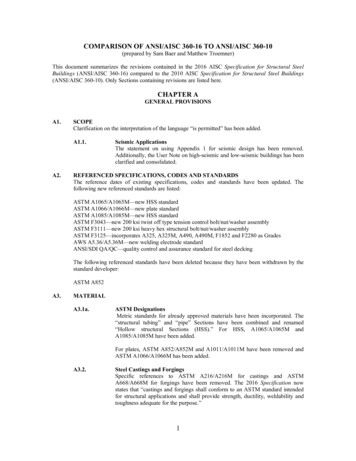
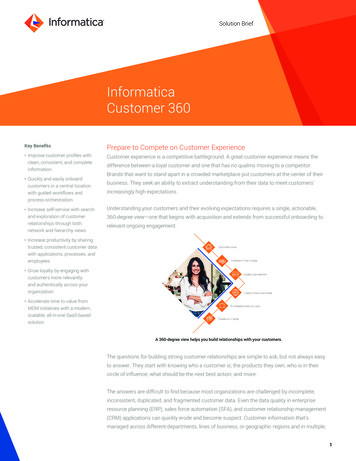

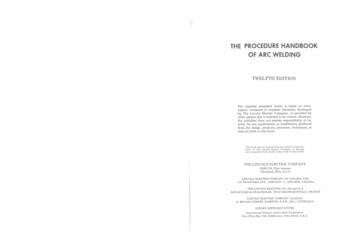
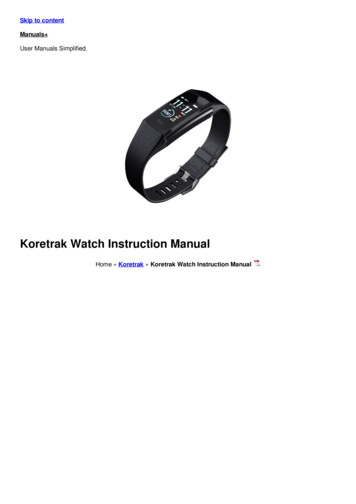
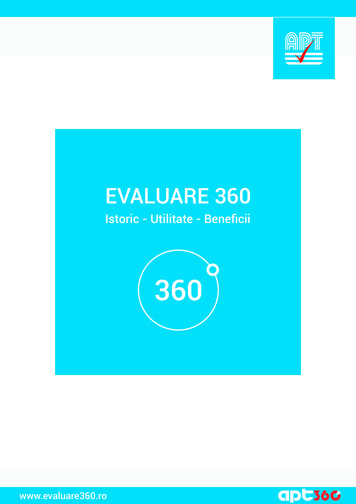
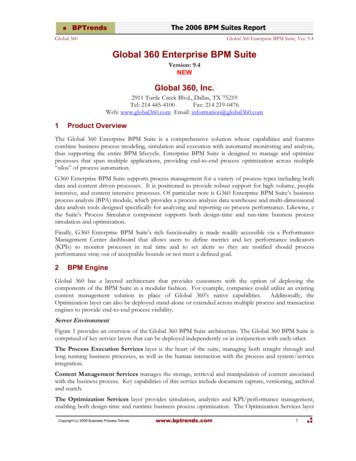
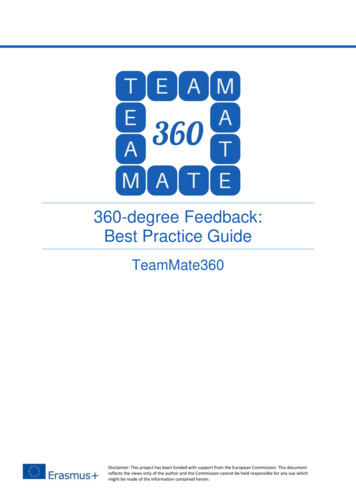
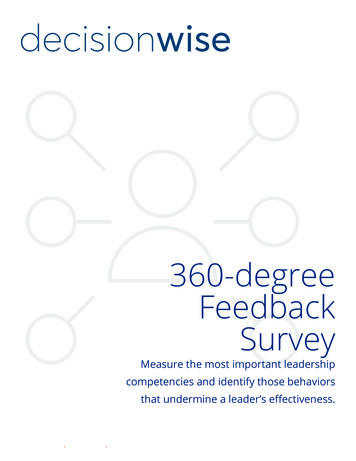
![Introducing the MDYA 360 v 2 9-10-16-1 [Read-Only]](/img/36/introducing-the-mdya-360-foltz-corrigan.jpg)
